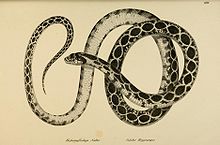- Horseshoe Whip Snake
-
horseshoe whip snake 
Conservation status Scientific classification Kingdom: Animalia Phylum: Chordata Subphylum: Vertebrata Class: Reptilia Order: Squamata Suborder: Serpentes Family: Colubridae Subfamily: Colubrinae Genus: Hemorrhois Species: H. hippocrepis Binomial name Hemorrhois hippocrepis
(Linnaeus, 1758)Synonyms The horseshoe whip snake (Hemorrhois hippocrepis) is a species of snake in the Colubridae family.
Contents
Geographic range
It is found in Algeria, Italy, Morocco, Portugal, Spain, Gibraltar and Tunisia.
Description
Adults may attain a total length of 1.5 m (5 feet). Its body is slender, and its head is wider than its neck. The eye is large, with a round pupil, and with a row of small scales below it. The smooth dorsal scales are arranged in 25-29 rows, and the ventrals number 220-258. Dorsally it has a series of large spots which are either blackish or dark brown edged with black. There are series of alternating smaller dark spots on the sides. The lighter ground color between the spots may be yellowish, olive, or reddish. The dark spots are closely spaced, giving the appearance of a dark snake with a light pattern resembling a chain or a series of X's. There is a light horseshoe-shaped mark on the neck and back of head.[2]
Habitat
Its natural habitats are Mediterranean-type shrubby vegetation, rocky areas, rocky shores, sandy shores, arable land, pastureland, plantations, rural gardens, and urban areas.
Conservation status
It is threatened by habitat loss.
References
- ^ Boulenger, G.A. 1893. Catalogue of the Snakes in the British Museum (Natural History), Volume I. London. pp. 409-410.
- ^ Arnold, E.N. & J.A. Burton. 1978. A Field Guide to the Reptiles and Amphibians of Britain and Europe. Collins. London. pp. 191-194.
- Miras, J.A.M., Cheylan, M., Nouira, M.S., Joger, U., Sá-Sousa, P. &Pérez-Mellado, V. 2005. Hemorrhois hippocrepis. 2006 IUCN Red List of Threatened Species. Downloaded on 28 July 2007.
- List of reptiles of Italy
This Colubrids article is a stub. You can help Wikipedia by expanding it.

